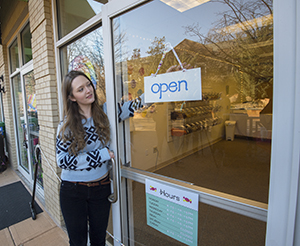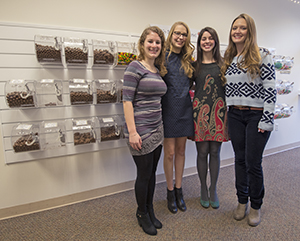Meet the health inspector in person.
Expect red tape.
And never underestimate your classmates’ appetite for Sour Patch Watermelons.
The student owners of Bear-y Sweet Shoppe, a by-the-ounce candy store on the campus of Washington University in St. Louis, have learned these lessons and more since joining the Student Entrepreneurial Program (StEP).

“Even in high school, I looked for ways to gain experience outside of the classroom,” said sophomore Jessica Landzberg, who owns the business with sophomores Shea Gouldd and Mary-Brent Brown, and junior Kailey Dreyfus, all students at Olin Business School.
“It’s great to go to a great business school, but you need to apply that knowledge,” Landzberg said. “We’ve already learned so much.”
After a year of planning, the Bear-y Sweet Shoppe opened Jan. 12 on Gregg Walkway on the South 40. Since then, students have been stuffing cellophane bags with chocolates, salted cashews, banana chips and other goodies. Cost: 57 cents an ounce. The store is open from 4:15-10:15 p.m., Sunday through Thursday.
“The response has been great,” Brown said. “Our goal from the start has been to make students happy. And they are. They’re happy with the price, happy with the variety, happy with the experience. In many ways, I feel like we are already succeeding.”
Still, Brown says the ultimate measure of success will be a strong balance sheet. StEP businesses are the real deal — they receive no money from the university and must turn a profit to stay open.

“We have to do everything any other business must do to succeed,” Brown said. “We have to maintain relationships with our vendors and the St. Louis County Department of Health, manage our finances, pay taxes and rent as well as respond to our customers.”
With a high degree of autonomy comes substantial support, said Mary Zabriskie, assistant director of campus life and StEP adviser. StEP provides guidance and resources, access to loans and a subsidized storefront along Gregg Walkway, the most-trafficked path on campus.
“A lot of colleges are talking about entrepreneurship — and are creating wonderful opportunities for students to experience entrepreneurship — but typically the students are not the owners,” Zabriskie said. “Here, the students conceptualize the business, create the business model, develop and run it over time. It’s a unique model.”
In its 15th year, the StEP program was the brainchild of the late Jim McLeod, who was vice chancellor for students and dean of the College of Arts & Sciences. A CD consignment business and video rental store were among the first enterprises. Today, there are nine StEP businesses.
StEP businesses
- Bears Bikes
- Bear Discounts
- Bear-y Sweet Shoppe
- Off the Row
- Sharing With a Purpose (SWAP)
- U Shuttle
- UTrucking
- Wash U Wash
- Wydown Water
Remarkably, Bear-y Sweet Shoppe is the first to sell food. The shop features 80 varieties of candy, nuts and dried fruit. The biggest sellers are the gummies — peach rings, chocolate-covered gummy bears, sour gummy worms and, of course, the aforementioned watermelons.
“Our vendors sent us a lot of samples,” Gouldd said. “We had to do a lot of testing.”
“Hard job, right?” Landzberg added.
Other firsts: the Bear-y Sweet Shoppe is the first StEP business founded entirely by females; the first to use a crowdfunding platform, in this case Kickstarter, to earn startup capital; and the first to tap into StEP’s new forgivable loan program.
“It requires a level of bravery and vision to take a leap into a new business, and these students have done it and beyond,” Zabriskie said. “Developing a business plan, thinking about issues like food safety, designing an inviting space — all of this demands a lot of effort and attention.”
‘No such thing as the average day’
Washington University alum Jacob Goodman said owning StEP operation UTrucking prepared him to purchase his next business, Fresh Prints, a custom apparel business that serves the college market. Goodman and co-owner Josh Arbit both graduated in 2014 with degrees from Olin. They currently employ a team of some 55 campus managers and artists.
“StEP is a big reason I came to Washington University,” said Goodman, who sold his share of UTrucking upon graduation, as program rules dictate. “There is a difference between letting students run a business and letting students own a business. If it goes great, you reap the benefits. If everything goes south, you are on the hook. That’s a really powerful thing that most universities can’t handle.”
Goodman wore many hats at UTrucking, which moves about 1,400 students every year. Among his many tasks: helping customers in the store, filing taxes and preparing balance sheets.
“With a startup, there is no such thing as the average day,” Goodman said. “You have to identify what needs to be done and do it. So I did everything that was public facing, but I did a lot of the back-end stuff. I learned so much.”
But Goodman admits he made mistakes too, namely underestimating the value of teamwork. His current employees have benefitted from that experience.
“At UTrucking, we just had goals and that was it. I thought, ‘If we don’t hit those goals, we’ve failed.’ But it’s not that simple,” Goodman said.
“With Fresh Prints, I took an entirely different approach. From the start we thought hard about culture. How do we stand for what we believe is right? How do we build our company philosophy? How do we cultivate the right atmosphere? It’s made a big difference.”